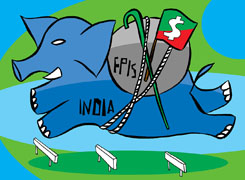Ramalingam Kalirajan |1025 Answers |Ask -Follow
Mutual Funds, Financial Planning Expert - Answered on Apr 16, 2024
He has an MBA in finance from the University of Madras and is a certified financial planner.
He is the director and chief financial planner at Holistic Investment, a Chennai-based firm that offers financial planning and wealth management advice.... more

Hi I want a health insurance for my family but unable to decide which one to choose. What are things need to know before taking Health insurance. I want total cashless insurance. I have heard some insurance company do not cover all in claim. How to know about that. Thankyou in advance
Family Coverage:
Member inclusions: Ensure the plan covers all your immediate family members (spouse, dependent children, and potentially parents depending on the plan).
Sum Insured: Choose a sufficient sum insured per person considering potential medical inflation and future healthcare costs. Opt for a joint sum insured or individual sum insured per family member based on your needs.
Cashless Network Hospitals:
Network breadth: Research the insurance company's network hospitals in your area. Accessibility and quality of hospitals within the network are crucial factors.
Cashless claim settlement ratio: Check the company's cashless claim settlement ratio, indicating the percentage of cashless claims approved. A higher ratio indicates smoother claim processing.
Policy Coverage:
Hospitalization expenses: Ensure the plan covers hospitalization bills, including room rent, surgeon fees, medications, and other related costs.
Pre-existing conditions: Look for a plan that covers pre-existing conditions if any family member has one. However, there might be waiting periods for coverage.
Daycare expenses: Some plans offer coverage for daycare expenses incurred during hospitalization.
Co-pay/Deductible: Some plans involve co-pays (fixed amount paid for specific services) or deductibles (amount you pay before insurance kicks in). Understand these clauses and choose a plan with terms that suit you.
Claim Settlement Process:
Claim settlement turnaround time: Research the average time the insurance company takes to settle claims.
Claim intimation process: Understand the claim intimation procedure and required documentation to ensure a smooth process.
Company Reputation:
Financial stability: Choose a health insurance company with a strong financial track record for claim settlements.
Customer service: Look for a company known for good customer service, especially regarding claim processing assistance.
Ways to Research Plans & Claim Coverage:
Company Websites: Most insurance companies have detailed information about their health insurance plans on their websites.
Insurance Comparison Websites: Websites like Policybazaar (https://www.policybazaar.com/), CompareRaja (https://health-plan-compare.com/), or Fincare (https://www.insurancedekho.com/health-insurance/news/religare-health-insurance-partners-with-fincare-small-finance-bank-7) allow plan comparisons and provide valuable insights.
Insurance Agents: A licensed insurance agent can help you compare plans, understand exclusions, and choose the one that best suits your family's needs.
Understanding Exclusions:
Most health insurance plans have exclusions, which are medical expenses the plan doesn't cover. Here's how to learn about them:
Policy Wording: Read the policy wording carefully, focusing on the exclusions section. This will clearly outline what isn't covered by the plan.
Speak to the Insurance Provider: Contact the insurance company directly and ask about any exclusions related to specific procedures or pre-existing conditions.
Choosing the Right Plan:
Don't just focus on premiums: While cost is important, prioritize comprehensive coverage over just the lowest premium.
Get quotes from multiple companies: Compare quotes from different providers to find a plan that offers the best value for your needs.
Ask questions: Don't hesitate to ask questions and clarify any doubts you have about the plan details or claim settlement process.
By considering these factors and thoroughly researching your options, you can choose a family health insurance plan with cashless coverage that provides peace of mind and financial protection for your loved ones.
You may like to see similar questions and answers below
Sanjib Jha | Answer |Ask -Follow
Insurance Expert - Answered on Apr 13, 2023
Jinal Mehta |60 Answers |Ask -Follow
Financial Planner - Answered on Mar 08, 2024
Ramalingam Kalirajan |1025 Answers |Ask -Follow
Mutual Funds, Financial Planning Expert - Answered on Apr 23, 2024
Samraat Jadhav |1693 Answers |Ask -Follow
Stock Market Expert - Answered on Apr 30, 2024
Samraat Jadhav |1693 Answers |Ask -Follow
Stock Market Expert - Answered on Apr 30, 2024
Samraat Jadhav |1693 Answers |Ask -Follow
Stock Market Expert - Answered on Apr 30, 2024
Ramalingam Kalirajan |1025 Answers |Ask -Follow
Mutual Funds, Financial Planning Expert - Answered on Apr 30, 2024
Sushil Sukhwani |328 Answers |Ask -Follow
Study Abroad Expert - Answered on Apr 30, 2024
Ramalingam Kalirajan |1025 Answers |Ask -Follow
Mutual Funds, Financial Planning Expert - Answered on Apr 30, 2024
Ramalingam Kalirajan |1025 Answers |Ask -Follow
Mutual Funds, Financial Planning Expert - Answered on Apr 30, 2024
Ramalingam Kalirajan |1025 Answers |Ask -Follow
Mutual Funds, Financial Planning Expert - Answered on Apr 30, 2024
Ramalingam Kalirajan |1025 Answers |Ask -Follow
Mutual Funds, Financial Planning Expert - Answered on Apr 30, 2024
Ramalingam Kalirajan |1025 Answers |Ask -Follow
Mutual Funds, Financial Planning Expert - Answered on Apr 30, 2024

























